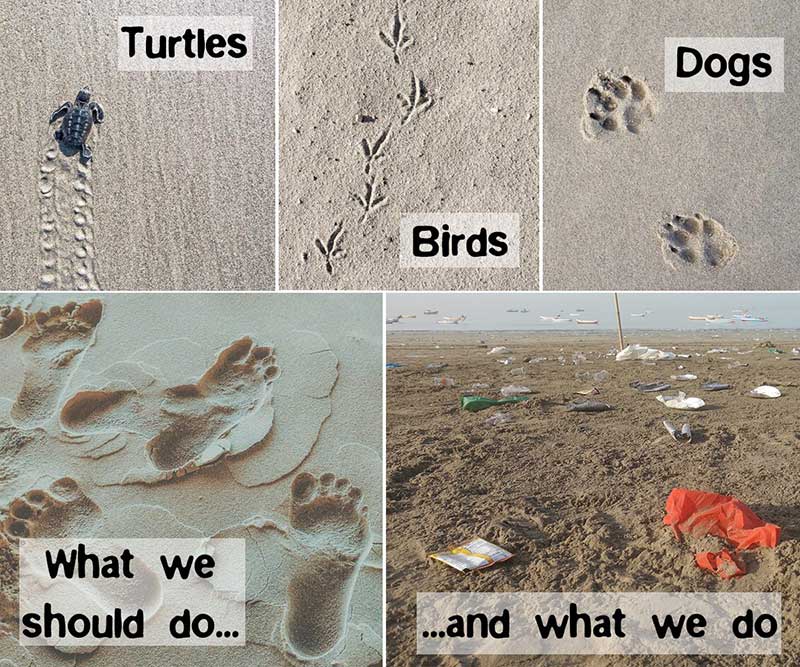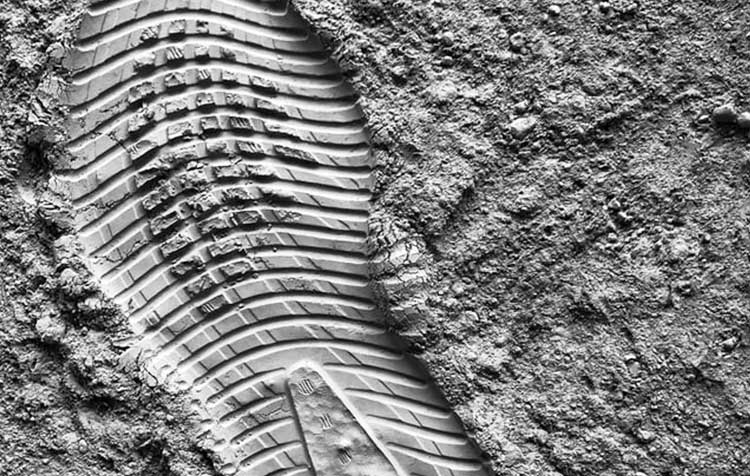What is the ecological footprint? We humans have maneuvered ourselves into a predicament and today must fight against the biggest environmental problems of our time fight. Whether climate change, deforestation of the rainforests or plastic waste in the sea. We consume more resources than the earth provides. The Earth Overload Day comes a little closer to the beginning of each year and reminds us of the impending catastrophes. If everyone in the world consumed as many resources as we Germans do, we would need three Earths. We are just living on credit. But since the effects of our own behavior are usually not directly visible and tangible, there is a lack of alarm in our society.
The ecological footprint is a useful tool that provides clarity and helps each individual realize their potential for a more sustainable life consciously. Here I would like to tell you everything you need to know about it - from the definition, advantages and disadvantages, to the calculation. Let's go!
What is the ecological footprint?
The Ecological Footprint refers to the biologically productive area on our planet that is necessary to sustain the accustomed lifestyle in the long term.₁ It is therefore a Synonym for our Resource consumption and a Sustainability indicator of a person, a company, a country or a regional society. One could also say that the ecological footprint provides information about how strongly ecosystems and the natural resources of planet earth claimed by us humans.
And what does the ecological footprint make us aware of? The more prosperous nations become, the larger their footprint becomes. Around 20 percent of the world's population consumes 80 percent of the planet's resources.₂ So the problem is rooted in uneven distribution - but also in the inefficient and excessive use of resources.
How to calculate your ecological footprint
First of all, it should be said that the ecological footprint not only personal CO2 emissions, but also all other environmental impacts of one's own behavior is taken into account. The value is a comprehensive and easily comparable yardstick for better assessing and improving the environmental impact of one's own behavior or, for example, the actions of a company.
To calculate your value you can use for example do a footprint test here. You simply answer honestly to the questions about everyday areas such as nutrition, living, consumption or mobility. After the test, you will also find out directly where there is still great potential for improvement.
Advantages & disadvantages of the ecological footprint
Now you've probably calculated your own value. No matter what the result was: either you have discovered a lot of potential for improvement or you are already on a damn good path. Here I would like to briefly explain the advantages and disadvantages of the ecological footprint, so that you are also motivated to orient yourself to this value in the future.
Advantages of the ecological footprint
- Comparability: As long as a calculation tool is constantly updated, the results of individual persons or companies can be compared very well. The ecological footprint thus also makes public discussions about sustainability much easier.
- Signal effect: Since the ecological footprint starts with each individual, it ensures a greater awareness that each individual also bears responsibility for ensuring that future generations have better or at least equal living conditions on this planet.
- Potential for improvement: Whether for individuals, companies or decisive politicians - the ecological footprint provides information on adjusting screws that can be turned in order to act more sustainably.
- Enlightening: Especially to people who have not yet dealt with the effects of their personal behavior on the climate change or the Deforestation of the rainforests The ecological footprint raises awareness of the issues we have dealt with in the past.
Possible disadvantages of the ecological footprint
- Undynamic calculation: Depending on when a calculation tool was created, it uses different statistics and data. The older the tool is, the more the result loses significance.
- Social & economic impacts not considered: Values like Purchasing powerand social-ethical aspects are not taken into account in the calculation.
Can you think of other advantages and disadvantages? Then feel free to write me a comment!
Reduce ecological footprint
Of course, I don't want to get to the conclusion of this article without giving you a few more tips to reduce your personal, environmental footprint. Here are some suggestions that are really quite easy to implement:
- Sustainable travel: Vacation travel is usually not sustainable because many thousands of air miles are traveled. But it's really easy to travel in a more environmentally friendly way. You can find out how to do this in the article about sustainable travel.
- Consciously avoid waste: Me the Plastic waste in the environment even got me to make my own lifestyle more sustainable. For example, do away with plastic bags by using a forever reusable jute bag. You can get more tips in the posts about the Zero Waste Lifestyle and the plastic free lifestyle.
- Reduce water consumption: You use water both directly, for example when you shower - but also indirectly, for example to grow the food you eat. In the article about the Water conservation you can get countless tips on how to reduce!
- Save energy: For example, use the residual heat of your oven for the last few minutes until your food is ready. Or set in the future on sustainable air freshenerssuch as an energy-saving fan. Learn more in the article about Power saving tips.
- Climate-friendly nutrition: For example, reduce your consumption of animal products. Because for the amount of animals we keep in cramped cages in the Factory farming The feed we have to provide costs vast amounts of natural resources. Whether it's feed, energy or water. Learn more in the article Making nutrition more sustainable.
- ... you can get even more tips in the article "Improve ecological footprint„.
This list is almost endless. For more inspiration you should definitely check out the post Protecting the environment in everyday life view
Do you have any other ideas? Then feel free to write me a comment about that too!
Ecological footprint - A meaningful indicator of sustainability

Our footprint is significantly different from those of other living creatures on Earth. Not only because we have a different footprint, but primarily because we behave unnaturally. We consume and waste an excessive amount of natural resources at the expense of other living beings - and we must learn to reduce our Making everyday life more resource-efficient. The ecological footprint starts exactly there and serves us a well comparable tool to evaluate and specifically improve the impact of our personal behavior on the planet. Even though the result may not be absolutely accurate, it still shows how sustainably you live yourself.
How did your personal ecological footprint turn out? I am curious about your comment.
Stay sustainable,

PS.: In the Knowledge blog I'll answer a lot more questions for you. For example, find out what lies behind the Sustainability triangle hides.
References:
₁ Wikimedia Foundation Inc: Ecological Footprint, available at https://de.wikipedia.org/wiki/Ökologischer_Fußabdruck. [19.05.2020].
₂ G. Müller (2016): Opening speech by German Development Minister Dr. Gerd Müller at the Future Congress, available at https://t1p.de/wnhu. [19.05.2020].






Hello Christoph,
that's what I call a very nice but also very detailed article on a topic that unfortunately receives far too little attention! You do a really great job here! Keep it up!!!
Love greeting
Olli
Hello Oliver! Thanks for your feedback! That's true, everyone should be concerned with their personal footprint. Let's hope that it will be part of the good tone in the future.
Greetings,
Christoph
Comments are closed.